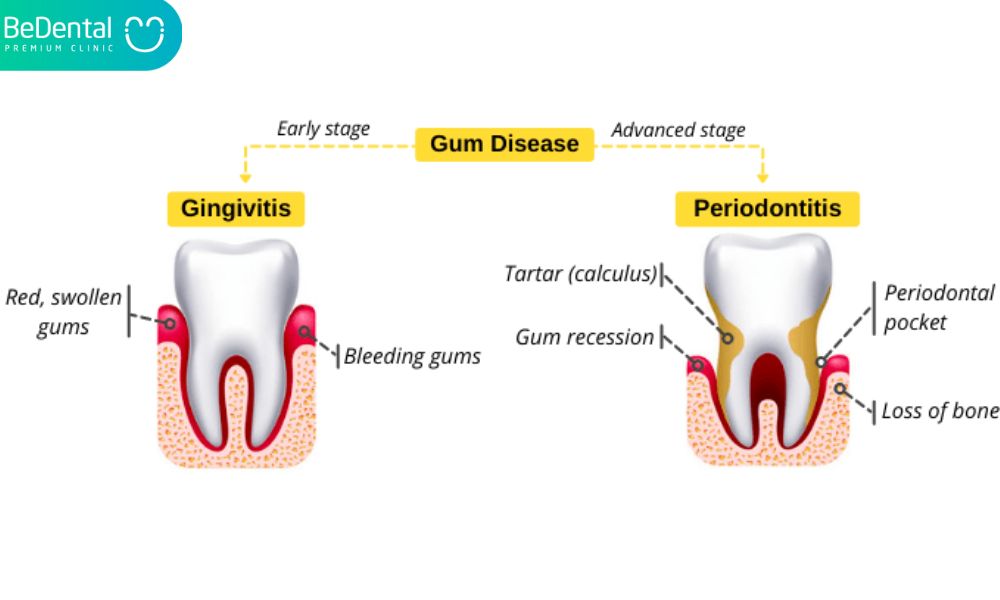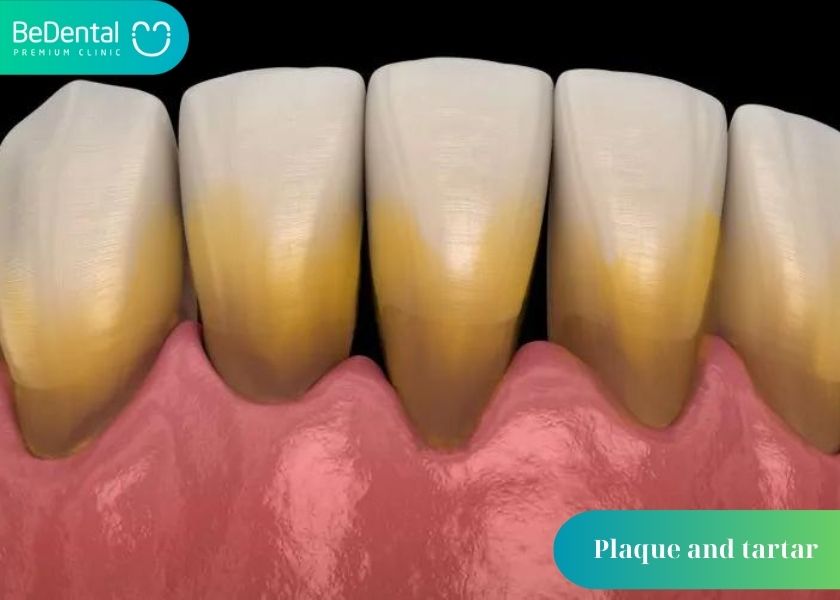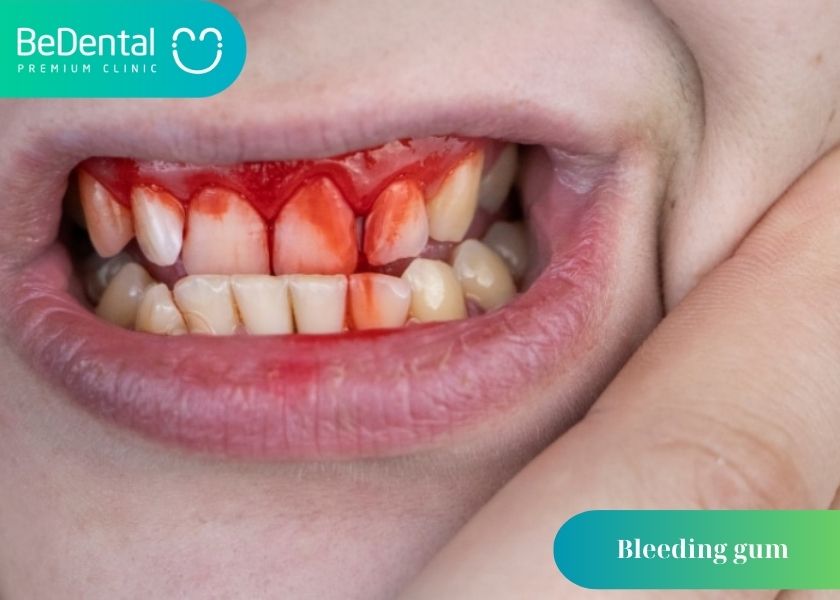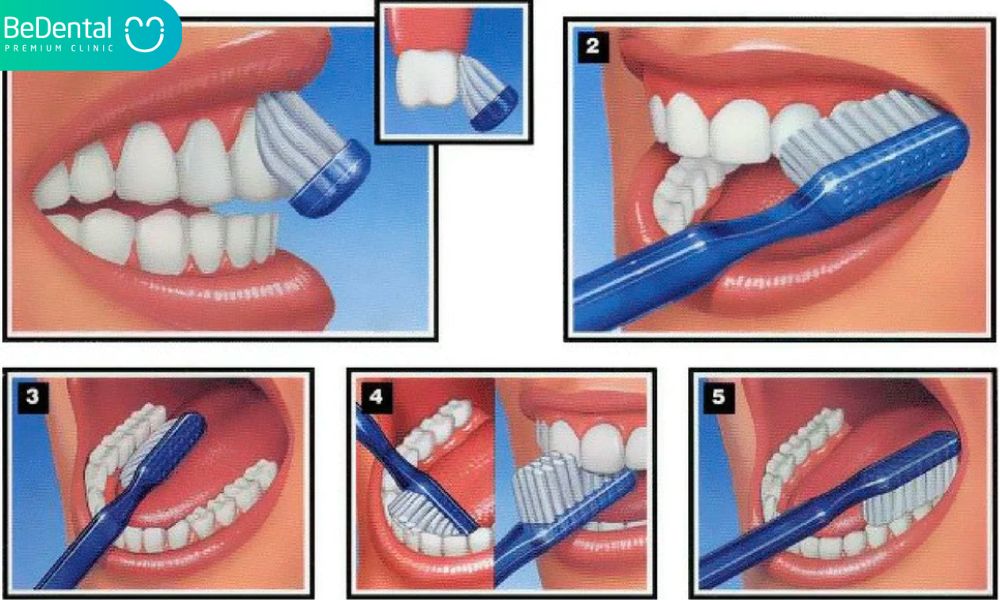Gum Disease and 3 Factors to Recognize Gum Disease in Vietnam: Gum disease can range from mild to severe. Mild gum disease is called gingivitis. Gum disease, also known as periodontal disease, is an infection of the tissues that surround your teeth. Let’s know more in this article!
What is Gum Disease in Vietnam?
Periodontitis, also known as gum disease, is caused by bacteria that damage the tissue surrounding your teeth. And in a serious case, you might experience tooth loss.
What’s the Difference Between Gingivitis and Periodontitis?
Typically, gingivitis (gum irritation) occurs before periodontitis (gum disease in Vietnam). But not all periodontitis comes from gingivitis. Almost everyone develops gingivitis at some time in their life, and because of its mild symptoms, it is simple to overlook. But if you don’t get treatment, it might worsen and affect your mouth. The good news is that you can stop it or even reverse it by brushing, flossing, and seeing the dentist on a regular basis.

As bacteria in plaque accumulate, the gums become irritated and more prone to bleeding while cleaning teeth in the early stages of gingivitis. The teeth are still securely embedded in their sockets, despite the fact that the gums may be inflamed. There hasn’t yet been any permanent harm done to bone or other tissue.
Plaque, a sticky coating of germs and food that forms around your teeth when you neglect to brush, floss, and rinse with mouthwash. The buildup of muck causes the production of acids that eat away at the enamel on the outside of your teeth, resulting in decay. After 72 hours, plaque becomes tartar, which makes it difficult to thoroughly clean your teeth and gums and forms along the gum line. This buildup over time irritates and inflames your gums, leading to gingivitis.
As a person has periodontitis, pockets occur when the inner layer of the gum and bone pulls away from the teeth. These tiny gaps between the gums and teeth trap dirt and can develop an infection. As the plaque spreads and increases below the gum line, the body’s immune system kills the germs.
The bone and connective tissue that keep teeth in place begin to deteriorate because of toxins or poisons that are created by the bacteria in plaque and the “good” enzymes the body produces to combat infections. The pockets deepen as the condition worsens, and more bone and gum tissue are lost. When this occurs, teeth lose their ability to hold their position and become loose. Adult tooth loss is most frequently caused by gum disease.
What Causes Periodontal Disease?

The main contributor to gum disease is plaque. Periodontal disease, however, may also be caused by other circumstances. A few of these include:
- Gums become more reactive as a result of hormonal changes, such as those that take place during pregnancy, adolescence, menopause, and monthly menstruation, which makes gingivitis more likely to develop.
- Your gums’ health may be impacted by illnesses. This includes illnesses that compromise the immune system, such cancer or HIV. Diabetes patients are more likely to acquire infections, such as cavities and periodontal disease, since the condition impairs the body’s capacity to utilize blood sugar.
- Because certain medications reduce saliva flow, which has a protective effect on teeth and gums, oral health can be impacted. There are some medications, including the anticonvulsant Dilantin and the angina medications Procardia and Adalat.
- The ability of gum tissue to heal itself is limited by bad habits like smoking.
- Gingivitis is more likely to form if you have poor oral hygiene practices, such as not brushing and flossing every day.
- Gingivitis development may be influenced by a family history of dental disease.
What Are Gum Disease Symptoms?
What are gum disease symptoms in Hanoi? Even in its latter stages, gum disease can grow without causing any noticeable symptoms. Although the symptoms of periodontal disease are frequently mild, they are not completely gone. Some symptoms may indicate a particular disease type. Gum disease symptoms in Hanoi include:
- Bleeding gums both during and after brushing your teeth
- Having red, inflamed gums. Gums in good health should be pink and firm.
- Persistent halitosis or an unpleasant aftertaste
- Recessed gums
- Deep pockets developing between teeth and gums
- Moving or loose teeth
- Alterations in the way partial dentures fit or the way teeth fit together when you bite down

You could still have some degree of gum disease even if you are symptom-free. Gum disease can sometimes just affect a few teeth, such as the molars, in a person. Gum disease in Vietnam may only be recognized and its course tracked by a dentist or periodontist.
How Do Dentists Recognize Periodontal Disease?
Your dentist often looks for these things during a dental examination:
- Bloody gums, swollen gums, hard gums, and deep pockets (the space between the gum and tooth; the larger and deeper the pocket, the more severe the disease)
- Movement of the teeth, sensitivity, and ideal tooth alignment
- Your jawbone can be used to identify the deterioration of the bone that surrounds your teeth.

What Are Gum Disease Treatments in HCM?
Gum disease treatments in HCM aims to inhibit the spread of the illness, stimulate the reattachment of healthy gums to teeth, and minimize swelling, pocket depth, and infection risk. The best course of action for you will depend on the severity of your condition, how you responded to previous therapies, and your general health. Options range from nonsurgical approaches to bacterial growth control to surgical approaches to rebuild supporting tissues.
What Can Be Done to Prevent Gum Disease in Vietnam?
What can be done to prevent gum disease in Vietnam? When proper plaque control is performed, gingivitis can be reversed and gum disease can almost always be prevented from growing worse. Professional cleanings at least twice a year, along with daily brushing and flossing, are required to effectively reduce plaque.
Two times every day, brush your teeth. Make use of fluoride toothpaste and a soft-bristled brush. Every three months, or sooner if the bristles start to deteriorate, change your toothbrush. Old, worn-out ones won’t clean teeth as well. Plaque on the surfaces of the teeth that can be reached is removed by brushing.

Use mouthwash. In addition to preventing gingivitis, antibacterial mouthwash also fights plaque and bad breath. The American Dental Association claims that antibacterial rinses help minimize the microorganisms that result in plaque and gum disease in Vietnam. Find out which mouthwash works best for you by asking your dentist.
Gum disease in Vietnam can be reduced in risk, treated less severely, and developed more slowly with other health and lifestyle improvements. And they are:
- Give up smoking. Smoking may damage your teeth and gums in addition to being unhealthy for your heart and lungs. Smoking increases the risk of gum disease among smokers by seven times compared to non-smokers, and it also reduces the effectiveness of several therapies.
- Be less stressed. Your body’s immune system may have a harder time fighting off illness if you’re under stress.
- Eat a healthy, balanced diet. The sugars and starches from food that the bacteria in your mouth consume drive their production of the acids that erode tooth enamel. Candy and junk food include a lot of added sugar and starch. To maintain the health of your teeth and gums, avoid them. Good diet aids in the immune system’s defense against illness. Your body may heal damaged tissue with the aid of antioxidant-rich foods, such as those containing vitamin E (vegetable oils, almonds, and green leafy vegetables) and vitamin C (citrus fruits, broccoli, and potatoes).

- Do not clench or grind your teeth. These repetitive motions could exert too much tension on the tissues that support teeth, which might speed up the pace of tissue deterioration.
Up to 30% of Americans may have a genetic predisposition to developing gum disease in Vietnam, according to the American Academy of Periodontology, despite practicing good dental hygiene habits and leading other healthy lifestyle decisions. Additionally, people who are genetically inclined may have a six-fold increased risk of developing gum disease. Gum disease in Vietnam may put you at higher risk if someone in your family already has it.
Your dentist or periodontist may advise more regular examinations, cleanings, and treatments if you are more prone to have gum disease in Vietnam in order to effectively control the problem.
See more
Scaling and Polishing – Deep Oral Cleaning and 5 Habits To Keep Teeth Healthy
GUM CONTOURING – DOES IT HURT AND HOW MUCH DOES IT COST?
Bad Breath and 6 Common Questions
Dentures and 2 types of dentures
Tooth Sensitivity and 6 Oral Habits to Prevent Tooth Sensitivity
Tư vấn chuyên môn bài viết:
BÁC SĨ DƯƠNG THỊ THÙY NGA






Pingback: Loose teeth and the 3 most common causes – Be Dental
Pingback: Oral Hygiene: 6 Tips to Improve Oral Hygiene – Be Dental
Pingback: Teeth grinding: 4+ things you must know – Be Dental
Pingback: Bad Breath and 6 Common Questions – Be Dental
Pingback: Dental tourism and 5 common factors influence the price – Be Dental
Pingback: Teeth Whitening and 6 Noticeable Questions Should Know – Be Dental
Pingback: Tooth extraction and 4 noticeable questions need to know – Be Dental
Pingback: Online Dental Consultation Servic – Safe Dental Examination Solution During the COVID-19 Pandemic – Be Dental